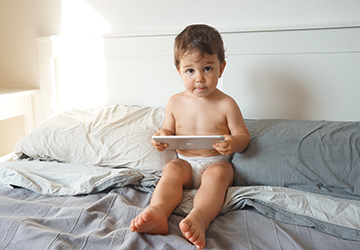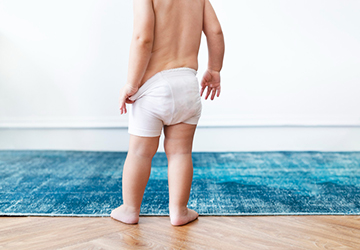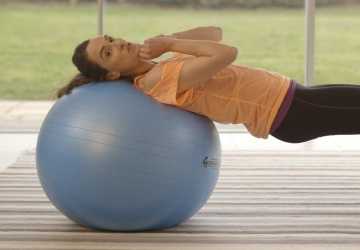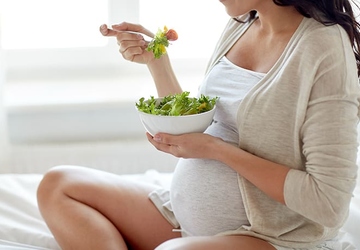Health and hygiene are among the many aspects of becoming a new parent. Newborns and infants are more delicate and prone to getting sick than many other adults, given that their immune systems are still in their developmental stages.
Health and hygiene are among the many aspects of becoming a new parent. Newborns and infants are more delicate and prone to getting sick than many other adults, given that their immune systems are still in their developmental stages.
If you are a parent who came here to search for the best diapering and hygiene tips for infant care, we have you covered. In this article, we will list the top 10 essential measures to take for diapering and hygiene of your infant.
What Role Do Diapering and Hygiene Play?
Diapering and hygiene are vital for infants' health, upbringing, and comfort. Proper diapering and hygiene limit the spread of germs and decrease the chances of rashes and illnesses, ensuring optimal health. On the other hand, dirty diapers support the spread of dangerous diseases, like hepatitis A and diarrhea, risking the health of the baby and the family members.

However, it is the responsibility of every parent to give their babies the best in everything; with the help of your child's pediatrician's advice, you can provide comfort to your infant in the best way through proper diapering and hygiene. Want to know some essential benefits of it? Here are a few listed for you:
Benefits of Proper Diapering and Hygiene for Infants
Below, we have gathered multiple diapering benefits of proper diapering and hygiene for infants. Let’s have a look!
· Maintains the health and well-being of an infant
· Ensures comfort and cleanliness
· Proper diapering helps to prevent urine infection
· Promotes a healthy environment for the baby
· Promotes good habits and routines from an early age
10 Measures for Diapering and Hygiene of Infants
Here are the ten measures you should take for diapering and hygiene of infants:
1.Frequent Changes of Diaper
Changing your baby's diaper frequently is crucial to maintain good hygiene. Changing diapers every two to three hours or whenever needed is suggested to prevent them from having any skin infection, rash, or discomfort.
2.Correct Size of Diaper
Choosing the right-sized diaper is essential for your infant's comfort and hygiene. Please don't use too tight diapers as they may lead to redness and skin rash; otherwise, loose diapers may cause leakage. Consulting a pediatrician may help in choosing a correct-sized diaper based on the weight and age of the child
3.Diaper-Free Time
Give your baby some diaper-free time every day. It is beneficial for their skin health. Allowing air to circulate through the diaper area helps prevent diaper rash and promotes healing. It is suggested to place a soft cloth or waterproof mat under your baby during this time in case of any accidents or blowouts.
4.Wipes and Cleansers
For cleaning your baby's diaper area, use a gentle cleansing wipe or wash directly with water. It is better not to use a chemical-based product with harsh ingredients, as it may lead to skin irritation. Opting for the wipes and cleansers your pediatricians may have recommended is necessary.
5.Rash Prevention
Infants have susceptible skin, and if not taken proper care, it causes them a rash. To prevent this, you must use a good amount of anti-rash cream or ointment every time you change your diaper. If you are still deciding what product to use, ask your child's pediatrician to recommend one.

6.Wiping Technique
Correctly wiping your baby is very important for their health; it is always suggested by every pediatrician to wipe from front to back to prevent any bacteria from spreading and to reduce the risk of urinary tract infections.
7.Hand Hygiene
For parents, having a clean hand and maintaining proper hand hygiene before and after every diaper change is essential. Always wash your hands thoroughly with soap and water. This practice helps prevent the spread of germs and ensures a clean diapering process.
8.Disposal of Diapers
Dispose of the used diapers hygienically and responsibly. Wrap the diaper in a disposable bag before discarding it in a trash bin. Keep the dirty diapers inside the container for a short time. Make sure to empty the bin regularly to maintain a clean and odor-free environment.
9.Bathing Routine
Regular bathing is essential to keep your baby clean and refreshed. For that, it is suggested to use lukewarm water and a mild baby soap or cleanser and gently wash your baby's body, paying attention to creases, neck, and diaper area. Finally, pat dry with a soft towel and moisturize if needed.
You can wash your baby’s hair once or twice a week. Pay special attention to the body creases, as some residue of milk or vomit might be left. To make baths joyful, let them play with bathing toys. The right time to introduce bathing time is the age of six months when the baby has reasonable head control.
10.Safe Diapering Practices
Lastly, parents must ensure a safe diapering environment by always keeping one hand on their baby, especially if using a changing table. The best step you can take for your child's safety is to lay them on a changing pad on the floor or bed. Make sure not to leave your baby in an elevated area.
Besides this, always use a fresh cleaning wipe, clean from front to back, and keep the dirty wipes and diapers away from surfaces that are not easily cleanable. This will ensure optimal hygiene and no germ spread, ensuring the health of the baby and the family.
Wrapping It Up!
You must have learned enough about the proper diapering techniques, their importance, and their benefits. Owing to them, you can maintain adequate diapering and hygiene practices by following these top 10 diapering and hygiene tips. Thus, you can ensure your little one stays clean, dry, and comfortable while reducing the risk of diaper rash and other health issues.
Always remember a healthy and happy baby starts with good hygiene habits. So, take advantage of these essential techniques. Stay tuned for more parenting tips, tricks, and how-to guides.


